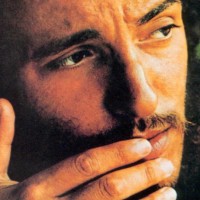Welcome to the first edition of Sparks Fly on E Street, in which me & my pencil take a tour of the entire Bruce Springsteen & the E Street Band catalog, one song each Monday morning. First, I must credit fellow Something Else! writer-type person S. Victor Aaron, who has been doing a fine job with the weekly Steely Dan Sunday, and who has inspired me to take on the (daunting) E Street songbook. For some reason, it had never occurred to me to begin this series until just after the passing of Clarence. His absence drives home the fact that none of this is forever, and that its time to focus on what matters. For as much as I’ve written about Bruce and his music, I’ve still never gotten close to explaining what it all means to me. So think of this series as a long-form reflection.
“Born in the U.S.A.” is of course far, far out of chronological order in the discography, but it’s the 4th of July, so why not kick things off with a “special edition”?
Many fans put the album itself far down on their list, with complaints of commercialism and overexposure. It’s true that Bruce was all over the radio (and MTV) back in 1984. Heck, I was at a business meeting one day (one of those awful “team-building” things that companies like to think actually builds teams) and during a quiet moment, a person in the adjacent room started to play “Born In The U.S.A.” on the piano. It was inescapable. What was also inescapable was the misunderstanding of the song’s intent. It always seemed kind of obvious to me. I mean, except for the chorus, there’s no flag-waving in the song at all. Maybe the anthemic quality of the music — the insistent synthesizer hook, Max’s explosive drum break, Bruce’s impassioned vocals — is what helps to drive the listener to a different conclusion.
I saw an E Street show once out in Albany, New York. At one point, Bruce brought out and acoustic guitar and played a slowed-down, bottleneck slide, solo version of the song. The guy behind me was absolutely livid: “What? He’s going to play it that way?!” I can’t remember if they played the “correct” version later in the show or not, but this man’s anger struck me as funny. These are Bruce’s songs, so shouldn’t he be able to do whatever he wants with them? It’s a free country, isn’t it?
Next up: Blinded By The Light.
[amazon_enhanced asin=”B00137GCI8″ container=”” container_class=”” price=”All” background_color=”FFFFFF” link_color=”000000″ text_color=”0000FF” /] [amazon_enhanced asin=”B00138CS6C” container=”” container_class=”” price=”All” background_color=”FFFFFF” link_color=”000000″ text_color=”0000FF” /] [amazon_enhanced asin=”B0000025UW” container=”” container_class=”” price=”All” background_color=”FFFFFF” link_color=”000000″ text_color=”0000FF” /]
- Why the Rolling Stones’ Harrowing ‘Gimme Shelter’ is Still Revealing New Depths - November 18, 2024
- How Talking Heads’ ‘Fear of Music’ Opened Up a World of Art and Sound - August 5, 2024
- How Deep Cuts Propelled Bruce Springsteen’s ‘Born in the U.S.A.’ - June 4, 2024




So you start off our weekends and now you are starting off the work week. Not too bad!
John Mellencamp’s Pink Houses, Bruce Springsteen’s Born in the USA, Little Steven’s Voice of America, and Steve Earle’s Copperhead Road all came out within a few years of each other. All were written by American songwriters, each telling a story about the American Dream. Each viewpoint invites criticism from the other three, but overall, there doesn’t seem to be a “winner.” Perhaps they are all reflections of how Americans accomplish the American Dream in various ways – still – I’d like to see these four sitting at a kitchen table trying to get their point across to each of the others.
For what it’s worth – I ‘d go with Steve Earle’ s Copperhead Road – hey the war’s over – let’s try a “brand new plan” that would make both daddy and grampa proud.